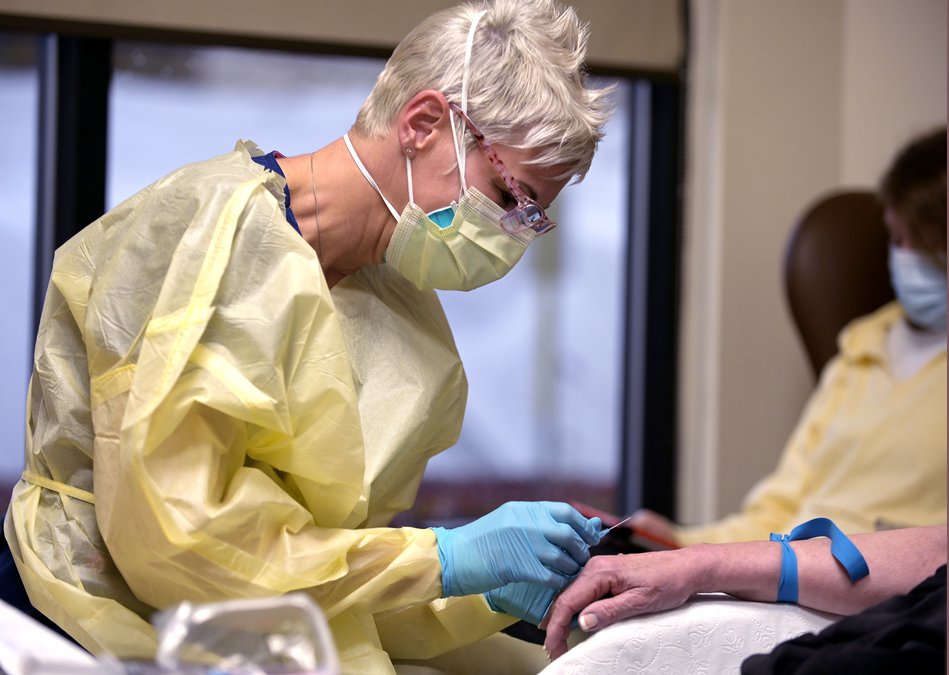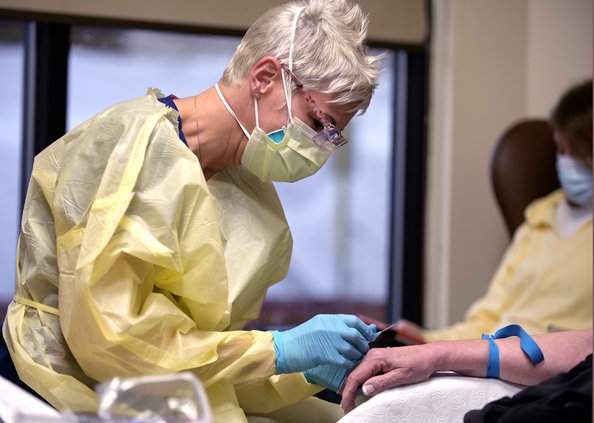The Northeast Georgia Health System is sponsoring coverage directly related to public safety so that it can be made available free to non-subscribers as a public service. News coverage is independently reported. We know that you need accurate and up-to-date information about the effects of the coronavirus in the state and our region. Please consider supporting our work by subscribing to The Times.
When Dr. Supriya Mannepalli sees an elderly COVID-19 patient in the intensive care unit, she wonders how the outcome could have been different.
One possible gamechanger for patients 65 and older as well as those with chronic health conditions is antibody infusions.
The antibodies have been found through two ways: convalescent plasma has the antibodies developed by a person who has recovered from COVID-19, and monoclonal antibodies are made in a laboratory to “mimic the body’s immune responses to fight COVID-19 infection,” Mannepalli said.
The Food and Drug Administration granted emergency use authorization in November for monoclonal antibodies to treat COVID-19, which the agency said blocks the virus’ “attachment and entry into human cells.”
“By reducing the viral load in the body, it prevents the disease from progressing to a more severe form and prevents the hospitalizations and the (emergency department) visits,” said Mannepalli, Northeast Georgia Medical Center’s medical director of infectious disease medicine.
Mannepalli said 450 such antibody treatments have been performed so far at Northeast Georgia Health System, with a dedicated COVID antibody infusion site set up at the Gainesville hospital this month.
“All of our (emergency department) campuses have the ability for patients presenting to them … to give these treatments, but we really don’t want to utilize our (emergency department) as the COVID infusion site given that (emergency departments) are so busy,” Mannepalli said.
The treatment is intended for COVID-19 positive people who are only suffering mild or moderate illness during the first 10 days of infection. Mild was described as fever, cough, muscle pain and other symptoms while not experiencing shortness of breath.
Moderate illness was defined as people with “evidence of lower respiratory disease during clinical assessment or imaging” but who have normal oxygen levels.
The FDA emergency use authorization specified the treatment for those 65 and older, but patients over the age of 12 weighing at least 88 pounds with certain chronic health conditions may be eligible. Mannepalli recommended people consult their doctor on their eligibility.
“What we need to really stress is that that’s when you should give it, because COVID-19 infection usually gets worse in the second week,” Mannepalli said about administering the treatment in the early days of symptoms.
The infusion takes an hour, and patients are monitored for a second hour for any allergic reactions or infusion-related reactions.
According to the Centers for Disease Control and Prevention, people ages 65-74 are five times more likely to require hospitalization compared to those ages 18-29, and the risk of death is also 90 times higher.
“As you have seen, our mortality (statistics) in the last month, the numbers have increased,” Mannepalli said. “We’re seeing patients sicker during this surge. Our (ventilator) use has gone up.”
Dr. John Delzell, NGHS’ incident commander, said during a webinar last week that the health system has seen one third of its COVID-related deaths in the past six weeks.
As of Wednesday, there have been 771 COVID-related deaths across NGHS. NGHS reported 287 confirmed COVID-19 positive patients Wednesday across its facilities with another 55 patients awaiting test results.
Mannepalli said hospitals that have been overtaxed treating the COVID-19 outbreak will need the space and staff to safely administer these types of treatments.
“Already hospitals are short staffed or at capacity,” she said. “That’s a big challenge because you don’t want to mix patients with COVID-19 infection coming to our outpatient infusion center where there could be patients getting chemotherapy or other medications.”



